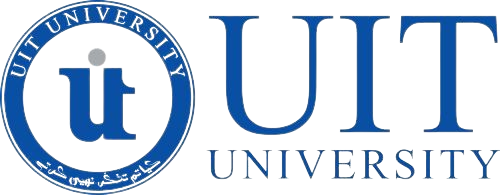Bachelor of Engineering Technology (Computer)
- Home
- Undergraduate Programs
- Bachelor of Engineering Technology (Computer)
Bachelor of Engineering Technology (Computer)
Bachelor of Engineering Technology Programs

Department’s Vision
The department of Engineering Technology fosters innovation and skills to produce top-notch professionals and entrepreneurs who can compete globally and drive positive change in quality of life.
- Overview
- Courses
- Mission, PEO's and PLO's
- Eligibility
Overview
Bachelor of Engineering Technology (Computer) program will prepare professional technologists, i.e., skilled specialists trained to work in computer engineering technology. This is as envisioned by National Technology Council (http://www.ntc-hec.org.pk/index.php) – the relevant accreditation body for engineering technology programs. As per NTC guidelines, the program curriculum incorporates OBE (outcome-based education) model that complies with the Sydney Accord.
Summary
- Duration of Program: 4 Years
- Number of semesters: 8
- Number of courses per semester: 5 or 6
- Total credit hours: 139
- Total number of courses: 33+Project+Field Training
First Semester
| Course No. | Course Title | Credit Hours | Nature |
|---|---|---|---|
| ET111 | Electronics Workshop Practice | 0+1 | Engineering Foundation |
| ET124 | Electrical Circuit Analysis | 3+1 | Engineering Foundation |
| ST113 | Applied Mathematics – I | 3+0 | Natural Sciences |
| ST123 | Applied Physics | 2+1 | Natural Sciences |
| CT133 | Introduction to Computer Fundamentals | 1+2 | Computing |
| HT112 / HT113 | Islamic Studies / Ethics | 2+0 | CS Core |
Second Semester
| Course No. | Course Title | Credit Hours | Nature |
|---|---|---|---|
| CT134 | Digital Logic Technology | 3+1 | Engineering Foundation |
| ET244 | Electronic Devices and Technology | 3+1 | Engineering Foundation |
| ST143 | Applied Mathematics- II | 3+0 | Natural Sciences |
| CT153 | Computer Programming | 2+1 | Computing |
| ST163 | Discrete Mathematics | 2+0 | Natural Sciences |
| HT122 | Pakistan Studies | 2+0 | Humanities |
Third Semester
| Course No. | Course Title | Credit Hours | Nature |
|---|---|---|---|
| CT214 | Computer Architecture and Organization | 3+1 | Major based breadth |
| CT221 | Engineering Drawing | 0+1 | Major based breadth |
| CT213 | Object Oriented Programming | 2+1 | Computing |
| CT224 | Algorithms and Data Structures | 3+1 | Computing |
| HT212 | Professional and Social Ethics N Humanities | 2+0 | Humanities |
| HT223 | Communication Skills | 3+0 | Humanities |
Fourth Semester
| Course No. | Course Title | Credit Hours | Nature |
|---|---|---|---|
| CT233 | Operating Systems | 3+1 | Major based Breadth |
| CT244 | Computer Graphics | 3+1 | Major based Depth |
| CT253 | Microprocessors | 2+1 | Major based breadth |
| CT271 | Web Engineering | 2+1 | Major based Depth |
| CT262 | Database Management System | 2+1 | Major based breadth |
| HT224 | Technical Report Writing | 3+0 | Humanities |
Fifth Semester
| Course No. | Course Title | Credit Hours | Nature |
|---|---|---|---|
| CT312 | Artificail Intelligence and Machine Learning | 2+1 | Major based Breadth |
| CT325 | Digital Signal Processing | 3+1 | Major based Depth |
| CT333 | Computer Communication Networks | 3+0 | Major based Breadth |
| CT344 | Advanced Web Engineering | 3+1 | Major based Depth |
| CT354 | Embedded Systems | 3+1 | Major based Depth |
Sixth Semester
| Course No. | Course Title | Credit Hours | Nature |
|---|---|---|---|
| CT365 | Digital Image Processing | 3+1 | Major based Depth |
| CT373 | Data and Network Security | 2+1 | Major based Depth |
| CT364 | Industrial Automation and Robotics | 3+1 | Major based Depth |
| MT313 | Project Management | 3+0 | Management Science |
| CT390 | Project | 0+3 | Major based Depth |
Sixth Semester (Summer)
| Course No. | Course Title | Credit Hours | Nature |
|---|---|---|---|
| CT390 | Project (Continue) | 3+3 | Major based Depth |
Seventh Semester
| Course No. | Course Title | Credit Hours | Nature |
|---|---|---|---|
| CT460 | 16 Weeks Supervised Industrial / Field Training (8×5=40Hrs / Week) | 0+16 |
Eighth Semester
| Course No. | Course Title | Credit Hours | Nature |
|---|---|---|---|
| CT460 | 16 Weeks Supervised Industrial / Field Training (8×5=40Hrs / Week) | 0+16 |
Program Mission
Provide the ambience to become industry ready Professionals and Entrepreneurs by offering curriculum based on cutting edge technology and experiential learning.
Program Educational Objectives
The Engineering Technology department trains graduates to be successful engineering technologists who use their knowledge and skills to develop innovative solutions for industry, government, academia, and society.
The main objectives that our graduates are expected to achieve in the long run are:
Will have demonstrated knowledge of relevant Engineering Technology appropriate for career pursuits and workplace needs.
Will have the ability to understand, diagnose, communicate and provide solutions to technical problems/situations for the benefit of the society.
Will demonstrate the intellectual curiosity to actively pursue the acquisition of new knowledge and skills necessary to refine and improve his/her abilities to contribute to the Technology domain.
Ethical commitment that allows them to deal successfully with social, technical and professional situations in their lives and work.
Program Learning Outcomes
- Engineering Technology Knowledge (SA1): An ability to apply knowledge of mathematics, natural science, Engineering Technology fundamentals, and Engineering Technology specialization to defined and applied Engineering Technology procedures, processes, systems, or methodologies.
Problem Analysis (SA2): An ability to Identify, formulate, research literature, and analyze broadly defined Engineering Technology problems reaching substantiated conclusions using analytical tools appropriate to the discipline or area of specialization.
Design/Development of Solutions (SA3): An ability to design solutions for broadly- defined Engineering Technology problems and contribute to the design of systems, components or processes to meet specified needs with appropriate consideration for public health and safety, cultural, societal, and environmental considerations.
Investigation (SA4): An ability to conduct investigations of broadly-defined problems; locate, search and select relevant data from codes, databases, and literature; and design and conduct experiments to provide valid conclusions.
Modern Tool Usage (SA5): An ability to Select and apply appropriate techniques, resources, and modern technology and IT tools, including prediction and modeling, to broadly-defined Engineering Technology problems, with an understanding of the limitations.
The Engineering Technologist and Society (SA6): An ability to demonstrate understanding of the societal, health, safety, legal and cultural issues and the consequent responsibilities relevant to Engineering Technology practice and solutions to broadly defined Engineering Technology problems.
Environment and Sustainability (SA7): An ability to understand and evaluate the sustainability and impact of Engineering Technology work in the solution of broadly defined Engineering Technology problems in societal and environmental contexts.
Ethics (SA8): Understand and commit to professional ethics and responsibilities, and norms of Engineering Technology practice.
Individual and Team Work (SA9): An ability to Function effectively as an individual and as a member or leader in diverse teams.
Communication (SA10): An ability to communicate effectively on broadly defined Engineering Technology activities with the Engineering Technologist community and with society at large by being able to comprehend and write effective reports and design documentation, make effective presentations, and give and receive clear instructions.
Project Management (SA11): An ability to demonstrate knowledge and understanding of Engineering Technology management principles and apply these to one’s work as a member or leader in a team and to manage projects in multidisciplinary environments.
Lifelong Learning (SA12): An ability to recognize the need for and have the ability to engage in independent and lifelong learning in specialist Engineering Technologies.
Candidates applying for this program must have passed higher Secondary School Certificate Examination (HSSC) II exam in Pre-Engineering or any equivalent qualification including DAE / A-level / ICS with at least 50% or 550 out of 1100 marks are eligible to apply for admission.
Pre Entry Admission Test
Candidates are required to:
pass the pre-admission entry test of the university,
pass UIT’s test in the last two years,
pass HEC’s Undergraduate Studies Admission Test (USAT) with 50% marks, or
score at least 800/1200 in SAT-I and secured at least 650/800 in SATII with subjects of Physics, Chemistry and Mathematics.
